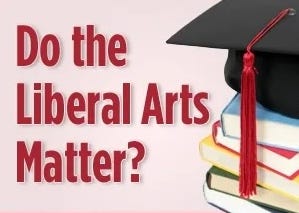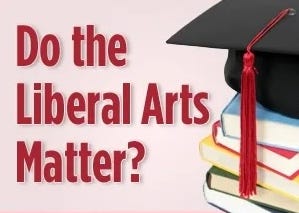An Open Letter to Christian University Presidents and Trustees
We Need You to Make a Robust Defense of the Christian Liberal Arts Institution
Dear President Jones and Trustees of Midwestern Christian University1
I want to affirm right off the bat that these are challenging times for Christian universities like Midwestern. The demographic cliff makes it more difficult to fill incoming classes. This is even more challenging given the rise of the Nones in the current generation who lack religious commitments. According to PRRI only 10% of Gen Z are white evangelicals, a group key to your past admissions efforts.
In addition, you are constantly faced with external criticism. There are attacks from media figures or politicians about the value of higher education in general. As private institutions, you are often thrown in the same category of elite institutions on the coasts.
There are attacks from the religious community as well. Denominations seek to maintain control over your institution. Evangelical gatekeepers online are ready to pounce should something attract attention suggesting that you have lost your Christian commitments.2
I served as a cabinet officer for nearly half my career. I know that maintaining the financial health of the institution is an ongoing challenge. I also know that the focus on the immediate bottom line can open the door to decisions that divert the focus of the institution is significant ways.3
Over the weekend, Messiah College’s John Fea highlighted recent program reduction decisions made by Cornerstone University in Michigan. On the heels of some voluntary — and involuntary — faculty departures last year, Cornerstone eliminated more faculty positions this year.
Last week, Cornerstone made more cuts. The humanities and music programs were eliminated. Seven tenured faculty were fired…. As I write, there are no full time faculty in history, literature, writing, languages, philosophy, or theology. If its website is any indication, Cornerstone actually still believes it is a “liberal arts college.”
Cornerstone’s decision may be more draconian, but it is not uncommon. This has been a trend across all of higher education. Many other Christian universities have engaged in “restructuring” or “program prioritization”. This has resulted in a slow shrinkage over time of faculty and programs in the humanities, the arts, the social sciences, and religion.
In one institution I served, the number of full time faculty in those areas is less than half what it was a decade ago. Where it made up 40% of the faculty in 2013, it is less than 25% today. Those faculty slots (with some overall shrinkage of the faculty overall) have been taken by more vocationally oriented programs.
This is a logical outcome given the metrics of program prioritization efforts. You look at numbers of majors, numbers of graduates, admissions demand, and program budgets. If there aren’t enough of the first three to balance the long-term prospect of the last one, then changes follow.
Nearly two years ago, I wrote about how research by Wendy Fischman and Howard Gardner demonstrated that many students take a transactional view of higher education, see it as a means to a job. They contrast that with what they call transformational education. They explored two other approaches: exploratory (experiencing what college has to offer) and inertial (choosing college because it was the natural next step).
Fischman and Gardner happily found that only 3% of their students fell in the inertial category. But the largest category was transactional, capturing 45% of the group. This was followed by exploratory at 36% and transformational with only 16%. I should note that for seniors, the transformational percentage went up to 22% (the transactional was actually a point higher than the sample overall, likely due to the nearness of finishing and worries about job prospects).
As universities like Midwestern Christian have headed down the program prioritization path, they have fallen into the same transactional trap that Fischman and Gardner warn against. What is the rationale for eliminating positions in humanities and social sciences? To open up faculty lines for the vocational avenues that prospective students are asking for.4 If the students want e-sports or cybersecurity or sports medicine, then we should give them that.
In such a context, what happens to a Christian Liberal Arts institution? Some Christian universities have adopted a vague sense of “critical thinking”. Others have taken the route of encouraging “professional ethics” into their pre-vocational courses. Still others have doubled down on their conservative Christian bona fides. I fear that most have simply claimed that nothing has changed at all.
In researching my book The Fearless Christian University (arriving Spring 2025 from Eerdmans), I found that the most common theme in Christian university mission statements was some version of “preparing students to be future leaders”. It seems to me that such a mission requires the liberal arts if those future leaders are going to effective. They need the well-rounded, freeing commitments of liberal arts to be able to handle the unknown and unknowable problems they will face down the road.
Such a future oriented mission moves institutions away from “getting a job” toward seeing students develop character and competence. In short, it’s a move toward Fischman and Gardner’s transformational model.
As trustees who have taken on the responsibility of assuring that mission is fulfilled and an administration who puts it into practice on a programmatic basis, you must be cheerleaders for the value of liberal arts. When hiring a new president or evaluating president Jones, there should be regular and deep conversations about how the president is supporting the liberal arts. If the board has too much of a finance and ministry focus (as many Christian university boards do), it is incumbent to recruit trustees who can fill that gap.
The true value of a liberal arts education is not found in a list of general education requirements that students must meet alongside their (supposed more important) major courses. They will be seen as unimportant courses to be “gotten out of the way” with minimal effort or engagement.
Christian universities like Midwestern have long provided training for new faculty in “the integration of faith and learning”. They rightly recognize that faculty coming out of grad school, especially in more professional areas, need assistance in what it means to teach in a Christian institution. But just as importantly, they need training in what it means to embrace the liberal arts.
The expectations for such a program reside at the top of the institution. They should also be part of the promotion and tenure process. An institution shouldn’t be any more likely to tenure a faculty member who can’t articulate the liberal arts commitments of the university than they would if one couldn’t explain its Christian commitments.
When Christian universities follow the transactional model, adding new programs to meet student interest while scavenging existing liberal arts programs, they fail to distinguish themselves from other institutions. The Christian university down the road has added the same programs. Both of you are competing with the state school a couple of hours away that has a broader resource base with a much lower tuition.
If, on the other hand, Midwestern Christian university proactively embraces its liberal arts commitments, it will explain those commitments to prospective students. They may have been looking for a program in cybersecurity or mechanical engineering or finance, but the Christian university will work to redirect their passions toward becoming the future leaders the mission statement says you’re all about. You could be surprised, there may be a bigger market out there than you’ve imagined.
It’s a big shift in orientation that will require investment and careful monitoring of resources. That shift is only possible if you can make the shift yourselves first.
Yours,
John Hawthorne
Retired Christian University Sociology Professor/Administrator
I’m using a fictitious institution to make writing and reading this easier.
See Grove City College
Programs for working adults and online graduate degrees are another avenue to shoring up resources with insufficient attention to how the university mission is expressed in those programs.
I wrote on social media yesterday that this is a never-ending cycle. By the time the new program is up and running and has graduates, student interest will have shifted to something new.





“this is a never-ending cycle. By the time the new program is up and running and has graduates, student interest will have shifted to something new”—This is what I’ve observed as well in my 20 years at my Christian university.